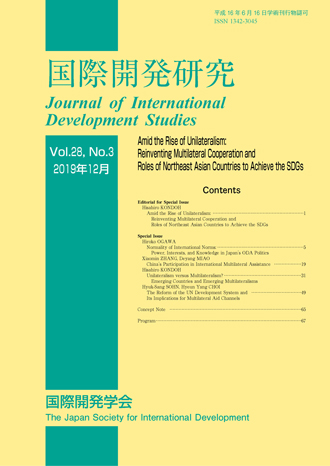28 巻, 3 号
選択された号の論文の5件中1~5を表示しています
- |<
- <
- 1
- >
- >|
Special Issue : Amid the Rise of Unilateralism: Reinventing Multilateral Cooperation and Roles of Northeast Asian Countries to Achieve the SDGs
Editorial for Special Issue
-
2019 年28 巻3 号 p. 1-4
発行日: 2019/12/26
公開日: 2020/03/19
PDF形式でダウンロード (264K)
Special Issue
Articles
-
2019 年28 巻3 号 p. 5-18
発行日: 2019/12/26
公開日: 2020/03/19
PDF形式でダウンロード (474K) -
2019 年28 巻3 号 p. 19-30
発行日: 2019/12/26
公開日: 2020/03/19
PDF形式でダウンロード (493K) -
2019 年28 巻3 号 p. 31-47
発行日: 2019/12/26
公開日: 2020/03/19
PDF形式でダウンロード (384K) -
2019 年28 巻3 号 p. 49-63
発行日: 2019/12/26
公開日: 2020/03/19
PDF形式でダウンロード (793K)
- |<
- <
- 1
- >
- >|
